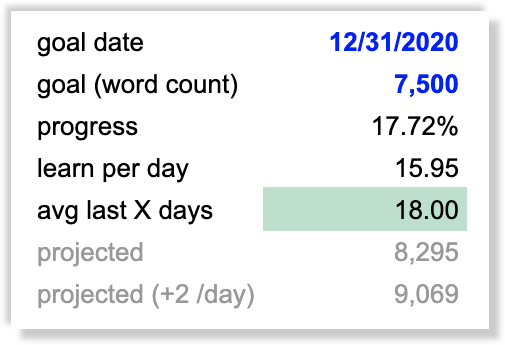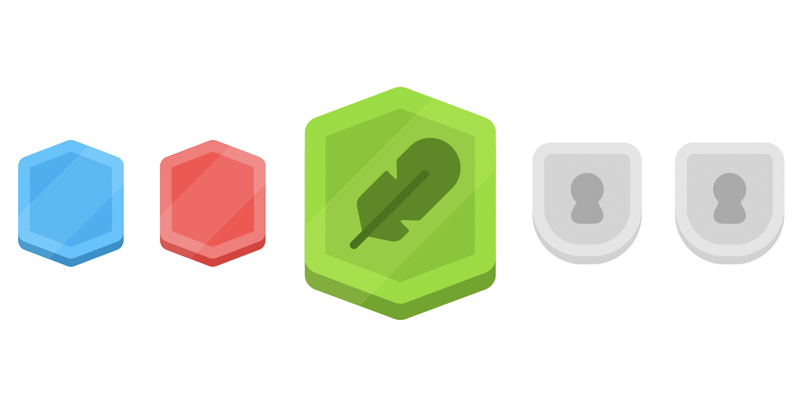let learning be the process of making something difficult, easy.
to test this, think of a skill you have. whether playing guitar or typing on a computer, you’ll probably agree you can do it effortlessly. but when you learned to type, your brain hurt. so what happened?
it starts with temporal vs permanent memory stores. in nerd terminology this is our RAM vs hard drive. first we insert something to our RAM, say a 4-digit code for the cafe’s bathroom door. if we recite that code enough times — perhaps because we have diarrhea — it transitions to our hard drive.
for the last few months i’ve experimented with methods to optimize this recitation step. my goal? to learn new skills as efficiently as possible, without repetitive bowel problems.
following are premature insights.
memorization
in Korean the word 공격, pronounced “gong-gyuk,” means attack.
i could move it to my permanent memory store through recitation alone, say 1-5x /week for a few months. this is the essence of SRS, or spaced repetition systems.
but since i need thousands of words for a basic-level vocabulary, i can’t afford to spend 5-10 minutes learning each one:
7,500 words * 7.5 mins => 937.50 hours (~1 hour /day for 3 years)
realizing this early in my language learning journey, i started playing with mnemonic devices. this is the association of imagery with a concept to make it “stick.”
here’s my device for 공격:
- in 2016 listened to a sermon in Dallas, Texas from a guy named Pastor Joe
- he talked about how, whenever he has a serious conversation with someone, he pre-empts the chat with “this is gonna’ get awkward” in Southern drawl where “go-” in “gonna” is pronounced “go”
- my device for the Korean word, 공격, becomes “gon’ git awkwerd” in my memory store (because attacks are awkward?)
- the “공” (gong) syllable matches Joe’s phrase just enough to trigger my recall for the second half of the word
although silly and nonsensical, my 공격 link is unshakeable, and i learned the word in fewer than 10 recitations over 3 months ago.
7,500 words * 2 minutes => 250 hours (< 1 hour /day for 1 year)
this optimization cannot be overstated. as of this writing i’m on pace to know 8,295 – 9,069 words by December 31, 2020:

i began studying 111 days ago, learning 1,329 words, for an average of just 11.97 words /day. in the last week i averaged 18 words /day, thanks to the next concept.
local maxima
laypersons enjoy debating a so-called “space” limitation of our brain. empirical evidence demonstrates humans have a lot more room than we give ourselves credit for, however, making the argument a moot point.
so how does this contend with the very real feeling that our brain is fried after just 1 hour of intense study?
in my opinion this is explained by our local vs global maxima. your local [learning] maxima, or daily limit, may require you to stop studying after learning 1 new chord or writing 50 lines of code. but someone else’s local maxima enables them to comfortably learn 5 new chords. so how can we increase our local maxima?
i have two suggestions.
first, instead of assuming only the information you want to absorb is sucking up your quota, imagine that every touch point in your life takes a cut:
- effort you exert choosing an outfit to wear
- advertisements you read
- conversations you have
- calories you consume
the quick judgement here is to consume “less,” but a better answer is to “consume the right amount.” eat too much, sluggish. eat too little, low energy. talk to nobody, depression. talk too much, you’ll be worked up emotionally.
i’ve increased my language learning local maxima by swapping English entertainment (movies, shows) with Korean media. by living in Korea to practice and hear my target language in the background all day. and by dividing my study into reading, listening, writing, typing (not the same as writing), and speaking.
reviewing vocabulary, then switching to grammar, for example, is like instantly making room for dessert at the end of a meal when we are otherwise too stuffed to eat more of the main course.
instead of 40 mins of every subject => brain fry, i can spend 30 mins (vocab) + 30 mins (grammar) => 60 mins of learning, or a 50% increase in my local maxima ((60 - 40) / 40). do this a few times per day and you learn 3x faster than the average person.
my second suggestion is exercise, more often called practice. if you learn 1 word a day for a week, you can probably learn 2 words a day starting the week after. i’m not sure how this works exactly, but our brain seems to condition itself for whatever input we feed it, so long as that input’s frequency is consistent.
maybe it’s also a self-preservation technique. seeking pleasure over pain, our brain paves a “highway” to make learning easier. sometimes i look at a new word in my flash cards just once or twice and it already feels like it’s in my permanent memory store. this did not happen just 100 days ago.
increasing recall
if someone asks your birthday, you respond immediately. if someone asks your dad’s birthday, it might take a couple extra seconds to recall.
let latency be the delay in this request/response cycle of information retrieval. all of us have latency, and all of our latencies are different on a topic by topic basis.
i’ll posit we truly know something when our latency is near zero. early guitar learners, while switching between chords, need more moments than the BPM of a song allows. because they can’t play along in-rhythm they give up, even though every great guitarist experienced this latency in the beginning.
latency is thus a better indicator of learning progress than volume. would you rather be able to switch between chords G, D, Em, and C quickly, or know 12 chords but need 3 seconds to reconfigure your left hand?
messy linear
there’s an expression: “if X were easy, everyone would do it.” let’s extend this to learning: “if X were linear, everyone would do it.”
the reason most of us know how to ride a bike, but don’t know how to wakesurf (barring obvious reasons), is because in bicycling there is a generally flat road and a bike. in wakesurfing there are millions of combinations of wakes, waves, wind, and boat speeds. each permutation significantly complicates the learning experience.
whenever this happens… a seemingly endless collection of variables is present in a discipline… we classify that skill as “difficult.” the recorder is an easy instrument to play, and the violin is difficult.
a more accurate distinction between these skills is that one can be learned linearly, and the other is learned non-linearly.
if you want to learn SQL (structured query language), for example, just spend a few hours on SQLbolt.com going through the lessons in order.
when i learned to code, on the other hand, i did so through a mix of 4am server crashes, accidentally overcharging customers, and punching my wall. there is no book that tells you to do any of these things to learn programming, but doing them was part of my experience nonetheless.
a master teacher is one who creates a simulation — better yet a “mirage” — of linearity to something that is actually not linear at all. this is why whenever you intend to learn a “difficult” skill, drafting a linear-looking study plan is a useful step toward smacking that b**** into place.
summary
here are some skills i’ve learned since childhood:
- riding a bike (linear)
- typing on a keyboard (linear)
- playing guitar, violin, ukulele, mandolin, piano (non-linear)
- programming (non-linear)
- public speaking (linear)
the most recent skill i picked up, programming, took approximately 18 months between September 2015 and spring 2017. my most objective takeaway from that experience was learning how to learn.
now that i’m studying Korean, i’m conscious about “how” i’m learning. doing so will help me replicate what works in future skill-building exercises. i also want to pass along these findings to others.
i’ve created a name for this project: building a conveyor belt to my brain. stay tuned for more insights as i work out the kinks in my learning factory.

Amazing lol. I now see you as a machine learning AI :D
How do you draft your study plans?
it’s a WIP (work in progress). currently i do different things in the morning vs afternoon vs evening. this is fungible of course. but i try to start with vocab review, then listening, then typing, then new vocab, then grammar. i also have tasks split by daily, weekly, or monthly. vocab is a daily exercise, while grammar concepts are weekly, tutoring is weekly, journaling is monthly, and so on.
How do you track your progress across all your different tools and skillsets? Is there an app that aggregates the data? Importing to spreadsheets? Make your own app to track? (I’m guessing the last) I’m working on Japanese now and need to put some better systems in place.
currently my “HQ God Board” is a spreadsheet, but i turned it into an embedded Chrome extension. now, whenever i open a new tab my lesson plan (spreadsheet) appears in an iframe in the blank Chrome window, reminding me what to do next. i have my days split between vocab, grammar, K-media, and so on. when there’s an app to play with you will be the first to know.